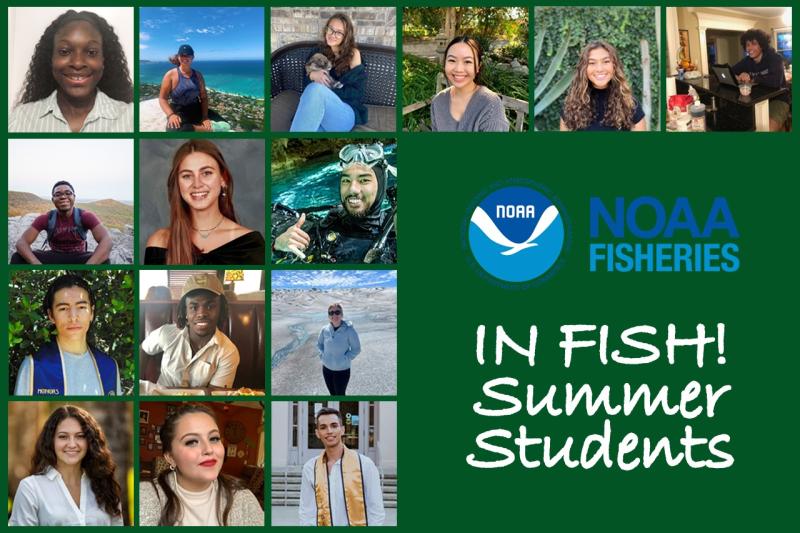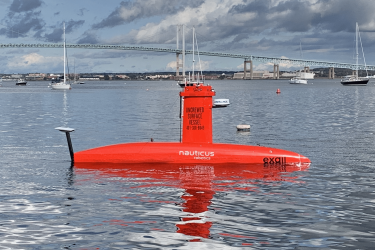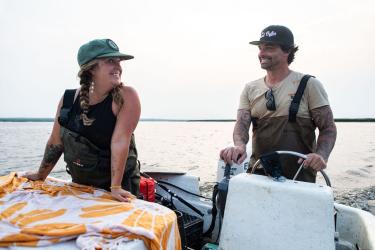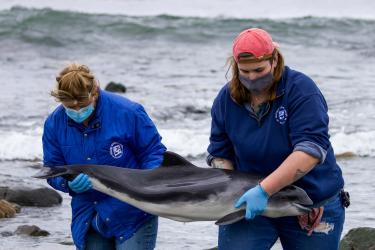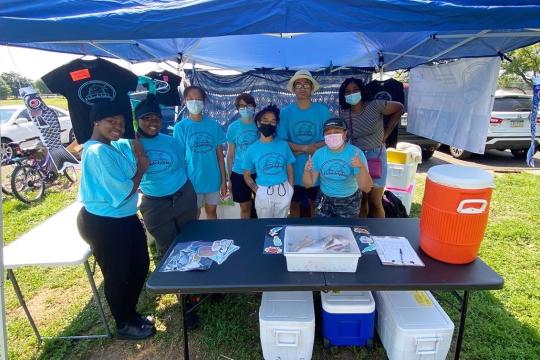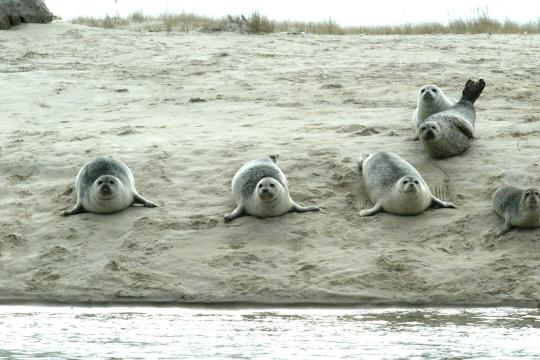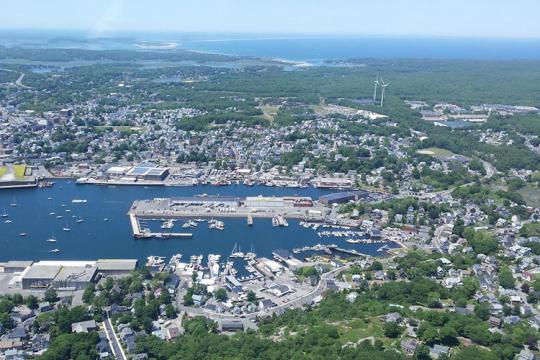IN FISH is a new program for partnering NOAA scientists with academic and private non-profit researchers to build a diverse and inclusive workforce. This is the inaugural class of IN FISH, and we have 15 students. They hail from at least 8 states, and 15 different colleges and universities in 9 states and Canada. Project topics range from environmental effects of offshore wind energy development, oyster health and restoration, climate change, questions on expanding habitat for bluefin tuna, aquaculture, social science, fishery management, weather, endangered species and environmental literacy.
In each profile, students outline their project, why it's important, and—always the best part—insights they’ve gained into a marine science career during their time with us.
Malia Armstrong
Bio:
Hometown: Seal Beach, California
University: Middlebury College in Middlebury, Vermont
Major: Environmental studies/biology
Internship Mentor(s):
- Science Center: George Liles
- Other: Jason Adolf, Monmouth University
Project:
For my project, I’ve been developing a beach bacteria level website using R. Users can input things like date and location and see the historical data on Enterococcus bacteria levels off the coast of New Jersey beaches. Much of my project has included filtering, combining, and adding to pre-existing data and developing ways that the data can be visualized so that it’s more accessible to the public.
Insight:
My favorite part about this internship has been diving into the process of trial and error while learning new packages in R. In working with unfamiliar packages, much of my time was spent looking up solutions to errors that I encountered and learning new methods to implement. This has improved my ability to figure out which questions to ask and helped me to work more efficiently. I found it extremely rewarding when my code runs successfully after a day of testing different solutions.
Thuy-Tien Bui
Bio:
Hometown: Orange, California
University: University of California, Riverside in Riverside, California
Major: Environmental sciences
Internship Mentor(s):
- Science Center: Meghana Parikh
Project:
My project uses a 20-year oyster pathology database to investigate links between disease prevalence and indicators of oyster health in Long Island Sound. The results of my project will be integrated into an oyster restoration mapping tool developed by the Connecticut Bureau of Aquaculture.
Insight:
IN FISH has given me the opportunity to learn new skills and grow as a scientist and researcher. A valuable skill I have developed during the internship is using a variety of softwares, such as Tableau, GIS, and R to create geographical visualizations, aggregate data, and statistically analyze relationships between variables. My favorite parts of the IN FISH program were meeting scientists from different fields and collaborating with the talented students of the 2021 cohort.
Jasmine Caillier
Bio:
Hometown: Lafayette, Louisiana
University: Texas A&M University, Corpus Christi in Corpus Christi, Texas
Major: Master’s degree program in biology
Internship Mentor(s):
- Science Center: George Liles
- Other: Graham Sherwood, Gulf of Maine Research Institute
Project:
For my project, I’m looking at the growth rates of 7 different fish species sampled in Casco Bay, Maine, between 2014-2020. We want to see what factors may be impacting growth rates. We’re particularly interested in factors like ocean temperatures since they’ve been increasing.
Insight:
My favorite part of the IN FISH internship is working one-on-one with my mentor and learning new things about a topic I haven’t studied before. I’m learning about different fish species found in Maine and what their temperature thresholds are and how they’re affected by climate change. I believe this internship will help me with my future aspiration to be part of the NOAA organization and help me learn more about different career opportunities in the field of biology. It’s also helped me see the different aspects of NOAA, ways I can afford graduate school, and how to start writing my thesis for graduate school.
Loowyza Colegrove
Bio:
Hometown: Hoopa, California
University: Humboldt State University in Arcata, California
Major: Biology
Internship Mentor(s):
- Science Center: George Liles
- Other: Grace Simpkins, Woods Hole Sea Grant, and Nicole Bartlett, NOAA’s Northeast Regional Coordinator
Project:
I’m working on the NOAA Live! Webinar series. This series is geared for students in grades 2-6 and features expert scientists from across NOAA speaking about their work. I’ve been creating activities for teachers using the NOAA Live! webinars series in their classrooms. I’ve also been analyzing webinar data to better understand participant demographics.
Insight:
My favorite part of my internship has been learning how each piece of every science fits in within the bigger system. I’ve learned a lot about the importance of making science accessible and about the different sciences and career areas within NOAA. This internship has helped me understand what career paths are good matches for my major and life goals.
Ava De Leon
Bio:
Hometown: Dallas, Texas
University: University of Miami in Coral Gables, Florida
Major: Marine affairs and public relations
Internship Mentor(s):
- Science Center: Sarah Gaichas
Project:
For my project, I’m analyzing fish diet data collected during the Science Center’s bottom trawl surveys. The goal is to identify ecosystem indicators for fishery managers to use in ecosystem-based fisheries management decisions.
Insight:
My favorite part of the IN FISH Program has definitely been connecting with people all over the country! I’ve learned so much from my intern cohort and am so proud of the work we’ve been doing. This experience has opened my eyes to countless career paths I can take in this industry, especially within NOAA Fisheries.
Robert Dellinger
Bio:
Hometown: Highlands, New Jersey
University: University: University of California, Davis in Davis, California
Major: Marine and coastal science and international relations
Internship Mentor(s):
- Chris Chambers, Tom Noji, and Ann Petersen
Project:
My project focuses on quantifying how contaminants in an urban coastal New Jersey river affect the health of white perch (Morone americana). To do this, I’m using histopathology to analyze gill, liver, spleen, and gonad samples.
Insight:
Working as an IN FISH intern has introduced me to a myriad of scientists and leaders within oceanic and atmospheric sciences, whilst simultaneously developing both my science and policy skills set. My internship has not only allowed me to work on government-funded science that is practical and applicable, but by pairing me with the James J. Howard Marine Sciences Laboratory, it has introduced me to an invaluable network of scientists that focus on issues that impact my local community along the Jersey Shore.
Emily Frisan
Bio:
Hometown: Anaheim, California
University: California Polytechnic State University, Pomona in Pomona, California
Major: Geography and multimedia communications
Internship Mentor(s):
- Science Center: Beth Phelan
Project:
I’m currently looking at the complex system of aquaculture and comparing and contrasting East and West Coast perceptions of it. My findings will be used to further explore people’s perspectives, identify reasons for varying popularity, and understand the public’s perception of salmon aquaculture.
Insight:
My favorite part of the internship has been the limitless opportunities to learn about ANYTHING. Having a strong support system of mentors, advisors, and an intelligent IN FISH cohort has introduced me to new skills that I can bring to any future position. I have learned so much about applying myself to the unknown possibilities and understanding that I can do anything I set my mind to. Studying the concept of complex systems has altered how I approach projects and problems on a daily basis. This position has brought me more than I could be thankful for.
Kate Gonzalez
Bio:
Hometown: Brockton, Massachusetts
University: Harvard College in Cambridge, Massachusetts
Major: Integrative biology
Internship Mentor(s):
- Science Center: Andrew Lipsky, Chris Orphanides, and Nick Sisson
Project:
I’m conducting a literature review on the potential hydrodynamic, oceanographic, and atmosphere impacts of offshore wind development along the U.S. Atlantic coast. This includes a range of impacts from very local to broad.
Insight:
My favorite part of the internship has been connecting with other peers to learn from one another and learning about the expanding sector of offshore wind development. The ecosystem dynamics course we took at the start of the internship helped me think of the world from a systems perspective. Together with my peers, we got to really dig deep into the components and functions of a system which has helped while working on my project.
Tremaine Hughes
Bio:
Hometown: Augusta, Georgia
University: Georgia Southern University in Statesboro, Georgia
Major: Biology
Internship Mentor(s):
- Science Center: Katey Marancik, David Richardson, and Harvey Walsh
Project:
My research project compares larval fish communities found from the Gulf of Mexico to New England during Atlantic bluefin tuna spawning season. My work helps describe the larval bluefin tuna habitat and compare abundance patterns from the Gulf of Mexico to the Slope Sea, an area in the Northwest Atlantic Ocean between the Gulf Stream and the continental shelf.
Insight:
I've had a lot of fun meeting new people and acquiring data analysis abilities that I hope to apply to research in the future. It's been a great adventure. This internship will benefit my future career as a scientist by providing me with networking opportunities and job-related skills.
Eric Klingberg
Bio:
Hometown: Tucson, Arizona
University: University of Hawai'i at Manoa, in Honolulu, Hawai'i
Major: Bachelor’s degree in global environmental science
Internship Mentor(s):
- Science Center: George Liles
- Other: Jenni Wallace, NOAA’s Office of Sustainable Fisheries
Project:
I’m working with the Office of Sustainable Fisheries to develop a strategic implementation plan to increase outreach and training for recent graduates, stakeholders, and underserved communities about fishery management decision-making processes. I’m also helping to catalogue fisheries and aquaculture education programs across the country. This will be used to select programs for additional funding and to identify new training opportunities.
Insight:
Being in the federal government, this position has opened many doors for me in different offices of NOAA Fisheries. I’ve been able to explore my curiosity in international fisheries, aquaculture, diversity and inclusion efforts at NOAA, and much more. Gaining awareness of NOAA’s different offices has exposed me to the different career opportunities that I’m interested in pursuing.
Aaron MacDonald
Bio:
Hometown: Easton, Massachusetts
University: University of Toronto in Toronto, Ontario, Canada
Major: Biodiversity and conservation biology
Internship Mentor(s):
- Science Center: Katherine Mcfarland and Sheila Stiles
- Other: Imani Black, Minorities in Aquaculture
Project:
I’m working with my mentors on the conclusion to an experiment that tested the effects of climate change on oyster growth. The experiment exposed oyster larvae to water conditions expected from climate change: decreased pH and salinity and increased water temperatures.
Insight:
This internship has been an amazing experience so far. My favorite part so far has been going into the lab and participating in spawning sea scallops. I think that kind of hands-on experience will be a great help in the future. The internship has been great for showing us how the scientific world functions and connecting us with many different scientists.
Matteo Torres
Bio:
Hometown: Wilmington, California
University: California State University, Long Beach in Long Beach, California
Major: Biology
Internship Mentor(s):
- Science Center: George Liles
- Other: Javier Fochesatto, University of Alaska Fairbanks
Project:
My project is focused on building a computer program that reads lidar data and analyzes it for low-level cloudiness during the winter in Fairbanks, Alaska. The goal is to create a program that will read the cloud signal, plot it with respect to altitude, and construct a derivative to find the base and height of the cloud. This helps scientists analyze and draw conclusions about increasing precipitation rates over time.
Insight:
My favorite part about the internship is being able to attend workshops that focus on providing useful resources for our career development. My favorite workshop, so far, was being able to hear from the graduate school panel about their experiences and their unfiltered journeys as young scientists. A new skill I gained during my internship is computer programming and using MATLAB to extract and analyze data.
Emily Vernon
Bio:
Hometown: Yakima, Washington
University: University of Alaska Southeast in Juneau, Alaska
Major: Marine biology
Internship Mentor(s):
- Science Center: George Liles
- Other Sarah Wise, Alaska Fisheries Science Center
Project:
My project focuses on institutional mapping and displaying informational pathways of different indigenous knowledge holders, institutions, and policies that are in place around Norton Sound in Western Alaska. The goal is to create Indigenous Conceptual Models (ICMs) that explore ecosystem processes of what’s occurring in the area, from subsistence fisheries to federal policies. This will help non-indigenous researchers and managers to better understand personal relationships prior to making fishing regulations that strongly affect the lives of indigenous people living in that area.
Insight:
So far my favorite part of this internship has been meeting other interns from across the country! I believe my fellow interns and amazing mentors will help me create connections that will benefit my career by pushing me out of my comfort zone. Through my project I am learning more about the social sciences which is something I have never studied, so I am excited to apply what I am learning in hopes to bring a different perspective to future research projects.
Elijah Ward
Bio:
Hometown: Staten Island, New York
University: Ursinus College in Collegeville, Pennsylvania
Major: Biology
Internship Mentor(s):
- Science Center: George Liles
- Other Kiirsten Flynn, Cascadia Research Collective and Amy Van Cise, Genetics and Evolution Lab at NOAA's Northwest Fisheries Science Center
Project:
For my internship, I’m working on two projects. One project entails using photos to track the behavior and health of tagged blue whales. The other project involves searching through acoustic data to identify bottlenose dolphin vocalizations near algae farms. The goal of these projects is to assess whether tagging and creation of algae farms is doing more harm than good and if it’s doing more harm, to brainstorm ideas that don’t threaten the health of marine mammals.
Insight:
I believe this internship will help me in my future career of becoming a zoologist because this internship is providing me with the skills and experience of what a typical day looks like for a research biologist. It also helped me improve my photo identification and data analysis skills—two highly sought skills by employers in the science workplace. This will make me more likely to get the career job I want.
Elisha Wilson
Bio:
Hometown: Brooklyn, New York
University: Lehigh University in Bethlehem, Pennsylvania
Major: Environmental science and psychology
Internship Mentor(s):
- Science Center: George Liles
- Other: Peter Kelliher, NOAA’s Greater Atlantic Regional Fisheries Office
Project:
This summer, I’ve been working with the Cape Ann Partnership for Science, Technology, Ocean, and the Natural Environment (CAPSTONE) to create a website that will be accessible to Cape Ann, Massachusetts, residents and beyond. The goal is to promote environmental literacy while also highlighting the important contributions of the local commercial fishing industry.
Insight:
My favorite part about my internship is that I’ve been able to assist a new organization in expanding its outreach. Over the past couple of weeks, I have seen the website come to life and I am grateful that I could have such a direct impact on the project. This internship will definitely help me to develop my communication skills. While creating content for the website, I’ve had to organize it in a way that is both engaging and informative. My experience will also strengthen my self-advocacy as I continue to network. Although it’s not over yet, I have grown so much both professionally and academically, and I am excited for what the rest of the summer has in store.
For more information, please contact Heather Soulen.
